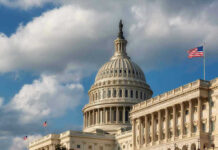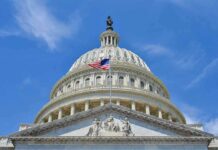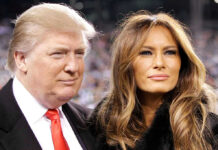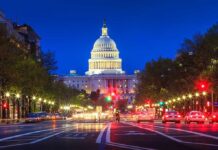
Donald Trump’s latest promise to slap a 100% tariff on foreign-made movies while attacking California Governor Gavin Newsom reveals a calculated strategy that could reshape both Hollywood economics.
Story Snapshot
- Trump proposes 100% tariffs on movies produced outside America in social media blitz
- California Governor Gavin Newsom becomes target of renewed attacks labeled as “weak”
- Entertainment industry faces potential economic upheaval if policy becomes reality
- Political messaging spans multiple issues from furniture to NFL in coordinated Truth Social campaign
Trump’s Hollywood Tariff Gambit
Trump’s 100% tariff proposal on foreign-produced films represents more than campaign rhetoric—it signals a direct challenge to Hollywood’s global production model. Major studios routinely film in countries like Canada, the UK, and Eastern Europe to capitalize on lower costs and tax incentives. A tariff doubling the import cost of these productions would fundamentally alter the entertainment industry’s economic calculations, potentially forcing studios to relocate operations back to American soil.
The timing of this announcement coincides with ongoing labor disputes and production challenges that have already strained Hollywood’s traditional workflows. Studios currently save millions by shooting abroad, but Trump’s proposed tariff would eliminate those savings while creating a powerful incentive for domestic production. This approach aligns with his broader “America First” manufacturing philosophy, extending protectionist policies into cultural and entertainment sectors.
Newsom Under Fire Again
Trump’s renewed attacks on Governor Newsom as “weak” follow a familiar playbook of targeting high-profile Democratic leaders. California’s influence on national politics makes Newsom a strategic target, particularly given his role in promoting policies Trump opposes. The governor’s handling of issues from homelessness to energy policy provides Trump with ammunition to contrast his approach with Democratic governance.
These attacks serve dual purposes: energizing Trump’s base while potentially weakening a Democrat who many consider presidential material. Newsom’s national profile and California’s entertainment industry connections make him particularly relevant to Trump’s movie tariff proposals. The convergence of entertainment policy and political attacks suggests careful coordination rather than random social media outbursts.
Claiming that movie production "has been stolen" from Hollywood and the U.S., President Donald Trump posted on his Truth Social platform that "I will be imposing a 100% tariff on any and all movies that are made outside of the United States."https://t.co/cUfxL41nDS
— PBS News (@NewsHour) September 29, 2025
Economic Reality Check
The entertainment industry employs hundreds of thousands of Americans, from actors and directors to technical crews and support staff. However, the global nature of film production means many projects involve international partnerships, locations, and financing structures. A 100% tariff could trigger retaliatory measures from trading partners, potentially limiting American films’ access to crucial overseas markets that often generate more revenue than domestic box office receipts.
Conservative economics typically favor free market principles, yet Trump’s tariff approach reflects a nationalist trade philosophy that prioritizes domestic production over pure market efficiency. The policy could succeed in bringing jobs back to American soundstages and production facilities, though it might also increase costs for consumers and limit creative options for filmmakers. The entertainment industry’s reaction will likely determine whether this proposal gains traction among voters who work in related fields across multiple states.
Strategic Political Messaging
Trump’s multi-topic social media blitz covering furniture production, NFL issues, and entertainment tariffs demonstrates a sophisticated messaging strategy designed to appeal to diverse voter segments. Blue-collar workers in furniture manufacturing, sports fans, and entertainment industry employees all represent crucial voting blocs in swing states. By addressing their concerns simultaneously, Trump positions himself as a candidate focused on American workers across multiple industries.
The breadth of topics also ensures maximum media coverage and social media engagement, keeping Trump in headlines while competitors struggle for attention. This approach has proven effective throughout his political career, generating discussion and debate that amplifies his message far beyond his direct social media following.
Sources:
Trump says US to impose 100% tariff on movies made outside the country

































